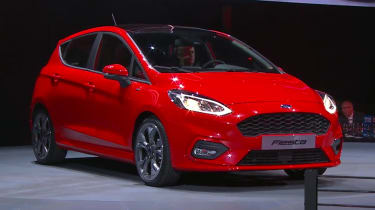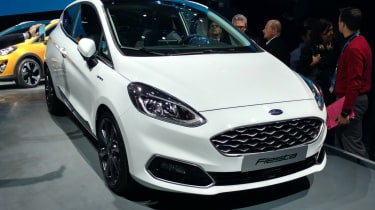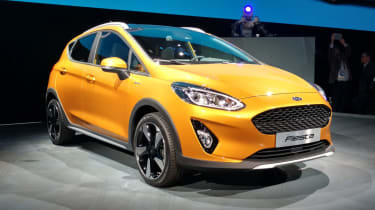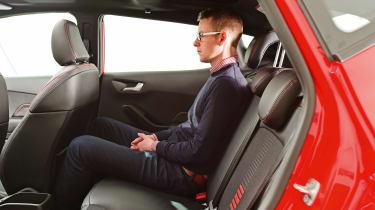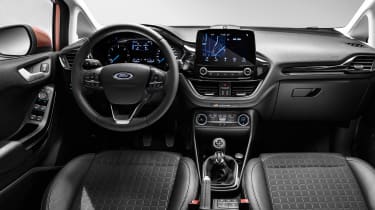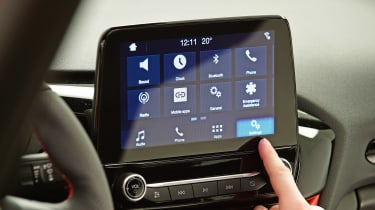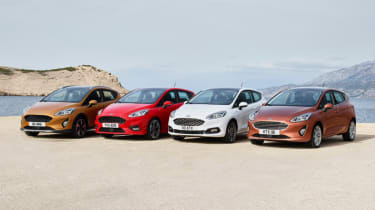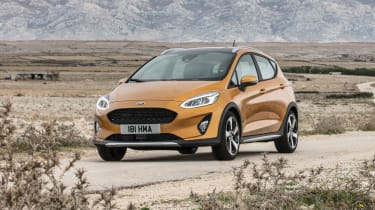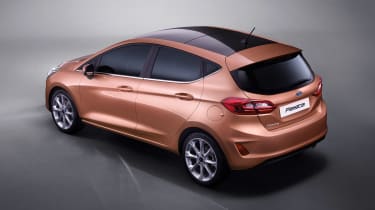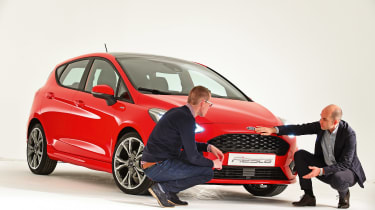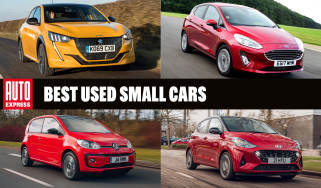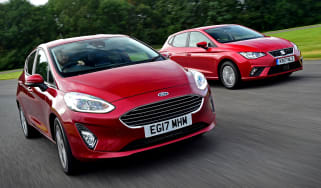New Ford Fiesta: Fiesta Active crossover now on sale in the UK
Ford's ever-popular supermini returns with a new seventh-generation model. Here's everything you need to know
The latest Ford Fiesta has picked up where the previous model left off, sitting right at the top of chart as the UK's best selling new car. Launched last year, Ford has continued its rollout into 2018, with the arrival of the new Fiesta Active - a crossover inspired variant of Britain's favourite car, which is on sale now from £17,990.
• Best selling cars on sale 2018
It’s been a long time coming, this latest Fiesta. The previous sixth-generation car made its debut in 2008, and this new seventh-generation car shapes up against other brand new rivals in the form of the SEAT Ibiza and Volkswagen Polo. A hot hatch version isn't far off too, with the new three-cylinder Fiesta ST arriving this summer.
New Ford Fiesta: prices and specs
Ford has priced up its new Fiesta supermini with the range kicking off at £12,715.
On sale now, the newest version of Britain’s best-selling car starts with the entry level Style model, rising through Zetec and Titanium before topping out at £19,345 for the Vignale version. Special edition B&O PLAY models also appear.
That entry-level price tag of £12,715 for the Style model includes 15-inch alloy wheels and body coloured bumpers as standard. Manual air-conditioning and an AM/FM radio with a 4.2-inch TFT screen with Bluetooth connectivity are found in the cabin, while Ford has also fitted the entry level supermini with a suite of driver and safety assistance features, including lane keep assist, hill start assist and automatic headlamps.
The Zetec model – a car that has long enjoyed being the best-selling version of the Fiesta range, accounting for 58 per cent of sales of the outgoing Fiesta – will start from £14,215. It’ll come with 15-inch alloy wheels, Ford’s Quickclear heated windscreen and SYNC 3 DAB radio with a 6.5-inch touchscreen with Emergency Assistance, Apple CarPlay and Android Auto.
• Best superminis on sale right now
As before, the next step up is the Fiesta Titanium, priced from £16,145. 16-inch alloy wheels, power folding mirrors and rear privacy glass make the cut, while key tech additions include an eight-inch touchscreen infotainment system with sat-nav, a 4.2-inch TFT screen embedded in the instrument cluster and automatic climate control. Additional assists such as automatic wipers and cruise control and traffic sign recognition are included. Titanium X perches above from £17,495 including premium additions including partial leather heated seats and a B&O audio system.
Among the models launching in the summer will be B&O PLAY editions. Available on Zetec and Titanium models, these cars come with Bohai Bay Mint or Chrome Copper interior trim and a B&O PLAY sound system which includes 10 speakers, a subwoofer and a central speaker on top of the instrument panel. These Fiestas also get an upgraded eight-inch touchsreen infotainment system and sat-nav, and start from £15,165.
The range-topping Vignale joins the Mondeo, S-MAX, Kuga and Edge as part of Ford’s upscale premium car range. It features 17-inch alloy wheels, different exterior and interior styling including leather and heated seats, a panoramic roof and a rear camera. Vignale Fiestas start at £19,345.
Sporty ST-Line cars start from £16,145, and include an ST Line bodykit, 17-inch alloy wheels, sports seats and pedals, plus a 6.5-inch touchscreen infotainment setup. Additional spec such as the larger eight-inch infotainment screen is included in the £17,495 ST-Line X model.
The high-riding Fiesta Active is priced from £17,990, with three separate sub-models available. All cars boast a rugged off-road inspired bodykit, plus roof rails, front fog lights, 17-inch alloy wheels and a raised ride height. Automatic headlights are standard kit, alongside lane keep assist and the new infotainment system loaded with SYNC 3. Fiesta Active B&O Play cars get a black roof and black roof rails, and a B&O Play audio setup with 360-degree surround sound and ten speakers. The flagship Active X gets partial leather upholstery with heated front seats, power fold mirrors with puddle lights, sat nav linked to an eight-inch touchscreen, a rear view camera and rear parking sensors.
New Ford Fiesta: design and interior
We took an early look at the new Fiesta in Germany back in November 2016. The first thing you’ll notice is the new design. According to George Saridakis, exterior design director at Ford of Europe, the car’s styling is “more evolution than revolution, with a more mature approach”.
Saridakis added: “It’s simpler and less fussy than the previous Fiesta, with a narrower daylight opening [windows] to make it look more elegant.”
It’s still instantly recognisable as a Fiesta, but the new car is 71mm longer and 12mm wider than its predecessor. Styling cues such as the swept-back headlights, simple bonnet and split wraparound tail-lamps at the rear help to accentuate the car’s extra width, but there’s a functional reason at the heart of the slight increase in size.
The previous Fiesta wasn’t the roomiest supermini on sale, but with a 4mm longer wheelbase – partly to house larger 18-inch wheels that are now available – Ford claims it has freed up an extra 16mm of knee room.
Space is helped by fitting slimmer front seats, and the new Fiesta is definitely more spacious in the rear than the old car, with competitive levels of head and legroom.
Ford hasn’t yet revealed how big the new Fiesta’s boot is, but Saridakis confirmed to Auto Express that it’s “within a few litres of the outgoing car”. That means we can expect a luggage capacity of around 290 litres, while access will be easier, thanks to a wider tailgate opening. The new Fiesta is also more spacious in the front, but here the space has come from redesigning the cabin layout.
“The interior is the opposite of the exterior,” said Saridakis, adding that “It’s a revolution in design terms”. In place of the current vertical centre stack with its excess of buttons, the new Fiesta features a wider dash with more horizontal elements, and the infotainment system is all new. With all of the main functions apart from the climate controls operated through the touchscreen, there’s almost half the number of buttons on the centre console, which will make it much simpler to use.
Quality has definitely taken a leap upmarket, and the Fiesta has a more refined feel inside. But there will also be more customisation options available for the new car, with features such as the mirror caps and roof available in contrasting colours. Buyers will be able to specify different coloured trim inserts for the interior, too.
There are three and five-door bodystyles as well, although the Active crossover only gets the latter option. The car also comes with what Saridakis calls a few different “faces”. Lower-spec cars feature the basic front end, while ST-Line gets a much sportier look with a different mesh for the bespoke grille and a deeper front bumper that “draws its inspiration from the Focus RS hot hatch”.
ST-Line trim was only introduced earlier this year on the outgoing Fiesta, but it’s already been a sales success, so it’s no surprise that Ford has chosen to differentiate it further. Above this, the Titanium and Vignale models look subtly different again.
New Ford Fiesta: chassis and suspension
The seventh-generation Fiesta is still based on Ford’s Global B-car platform, but it has been tuned to offer 10 per cent more grip, according to the brand. Along with the introduction of electronic torque vectoring to improve agility, the front and rear tracks have increased by 30mm and 10mm respectively for a wider stance, and there’s 20 per cent less friction in the steering to help feel.
New suspension bushes improve steering response, but Ford also claims that they better isolate the passenger compartment from the road, reducing the effect of small bumps and road noise. ST-Line models also get a sportier chassis set-up.
New Ford Fiesta: engine line-up
Ford is offering a wide range of petrol engines, the core trio of which are underpinned by Ford’s 1.0-litre three-cylinder EcoBoost turbo petrol offered in 99bhp, 123bhp and 138bhp guises. This will have a six-speed manual gearbox to help keep CO2 emissions down to as little as 95g/km and will feature cylinder deactivation tech from 2018. There will also be a six-speed auto with steering wheel paddles for the 98bhp model, while a new entry level naturally aspirated 1.1-litre three-cylinder with either 69bhp or 84bhp makes its debut, emitting 101g/km of CO2.
As for the diesels, the new Fiesta will be the first model to get a high-power TDCi unit. Ford’s 118bhp 1.5 TDCi is anticipated to emit 89g/km of CO2, while the more modest 84bhp diesel is predicted to offer even lower CO2 emissions of 82g/km.
The hot Fiesta ST will swoop in with a 1.5-litre turbocharged three-cylinder producing 197bhp and 290Nm of torque. Ford claims that the new ST can sprint from 0-62mph in 6.7 seconds, and though we haven't got a top speed it should be capable of cracking 140mph.
All engines are offered with stop/start and some editions get an active aero front grille to squeeze out a few more miles per gallon.
New Ford Fiesta: safety and technology
Fresh technology also extends to the new Fiesta’s safety systems, with Ford’s Pre-Collision Assist with Pedestrian Detection available.
In addition, it’s the first supermini in Europe to offer Cross Traffic Alert. This is one of 15 driver assistance systems, alongside adaptive cruise, blind spot and forward collision warning, lane keeping aid, traffic sign recognition, automatic perpendicular parking and auto high-beam headlamps. LED lights will also be an option, while a clever new design for the seatbelts helps reduce slippage under the belt in a crash, so there was no need for Ford to include a driver’s knee airbag in the newcomer. It’s aiming for a five-star Euro NCAP rating.
New Ford Fiesta: new family members
Ford has made a big deal over the differentiation of the various new models that bear the Fiesta nameplate. As a result, the Titanium version – which should make up the majority of sales – features a different chrome grille and simpler front and rear bumpers.
The Fiesta Active crossover will be the first of many Active models rolled out across Ford’s range. It wears black plastic cladding, as well as a black decal on the boot and a different grille. It also gets an increase in ride height of “15-20mm”, according to Saridakis. Ford wouldn’t outline if the Active will be sold with a four-wheel-drive option, although it’s unlikely.
A luxurious Fiesta Vignale is also added to the line-up, with unique 18-inch alloys, a panoramic roof and some satin-finish detail that’s been “applied sparingly, as less is more with Vignale”. Inside, the range-topping Fiesta gets Tuxedo-stitched leather seats and bespoke trim inlays with a 3D texture.
New Ford Fiesta: Q&A with Jim Farley
Former CEO of Ford Europe and Chairman, now Executive Vice President and President of Global Markets
Q: It’s interesting that you’ve removed the lower-end trim levels from the Fiesta range and added two higher-end ones in Active and Vignale. Can you explain a little about how that has happened?
A: Well, Ka+ gives us a foundation that we’ve never really had before - a proper five-door that’s also affordable. But Fiesta’s always had a nice personality, and now we’ve given each of those personalities its own execution.
We’ve been focusing on how to deliver more emotion in the car, and ‘Active’ came up in discussions. And when the team did some work on it, they suddenly realised they were on to something. I really think the Active could be enough of an SUV for a lot of people, particularly those who just want a higher seating position more than really high ground clearance. Of all four versions, it’s the one that’s the most of interest to me - to see how it goes in the market.
As for Vignale, I wouldn’t be surprised if premium competitors entered the B-segment; some of them are there already, in fact, although they’re a lot more expensive than us. But we have customers who want more; if you look at our mix of Titanium in the UK and Europe, it’s starting to become almost our volume model. So we have to give people more choice; that’s what Vignale is about in general.
Look at a model like Kuga right now. Seventy percent of the Kugas we sell are Titanium.
Q: But is there any reason why someone buying a supermini shouldn’t want the same customer service perks that a Mondeo Vignale customer is getting access to?
A: No, not at all. That’s exactly the point. You get the same access to loan cars, the car wash, cool things - we all want those! We can do it in scale now because we have it on Mondeo, S-Max, Edge, and now Fiesta - so the dealer can invest the money and get a return. On Mondeo Vignale is about 10 percent of sales, on S-Max it’s just above 10 percent.
Q: What about on Fiesta?
We have production numbers but I’m not going to disclose them. But it’s really too early to tell. We do have a lot of work ahead before the summer to get the network ready because the Fiesta is very different from an Edge in terms of sales numbers and scale.
What’s important to me is that the executions of all of the four types of Fiesta - ST-Line, Vignale, Titanium and Active - are distinct. We’re already getting some people, some engineers, who say they’d like ST mixed with Active!
Q: Could that happen?
Maybe, who knows? We're just getting started with this thing.
New Ford Fiesta: Q&A with George Saridakis
Exterior design director, Ford Europe
We sat down with the man responsible for the design of the new Fiesta and got his take on why and how the new car had to change.
Q: What was the design goal for the new Fiesta?
A: “Our research showed that Fiesta buyers are maturing. For the last car we had a target customer we called Antonella. She was quite fashionable and young, and she was still living with her parents.
“But now the typical Fiesta customer has grown up, got their own place and has a bit of money; they’re a bit older than Antonella was, so the target was to deliver a more mature car.”
Q: How does the design reflect that?
A: “It’s less of a fashion statement and more a timeless design. There are fewer lines and stronger surfaces; it’s uncluttered and less busy than the outgoing car, but still recognisable as a Fiesta.
“It had to be distinct and have its own identity. We’ve designed it more with customisation in mind, as well as the different ‘faces’ of the various models within the Fiesta range, too.”
Q: How did adding the Fiesta Active crossover to the range influence the car’s design?
A: “It influenced it a lot. We’ve designed the Fiesta with derivatives in mind, so it was quite a challenge to ensure an Active, a Vignale, an ST-Line, a Titanium and the base car all stand on their own.”
Q: What was the biggest challenge in designing the new car?
A: “Getting the aerodynamics to work for efficiency while preserving the shape we wanted. It’s quite a round, seamless looking car but with big shoulders compared with its predecessor, and all that sculpture isn’t great for aero. “We had to optimise the shape to reduce drag but also keep the look strong, as we wanted the Fiesta to be a more emotional product. Then there are the practicalities of the boot opening, and so on.”
Q: What about the inside?
A: “It’s really a step up. It’s a lot more user-friendly, very ergonomic, less cluttered and more driver-centric, too. The design amplifies the width, but it’s also a more efficient use of space, while quality has taken a big leap over its predecessor.”
What do you think of the new Ford Fiesta? Let us know below…
Find a car with the experts

